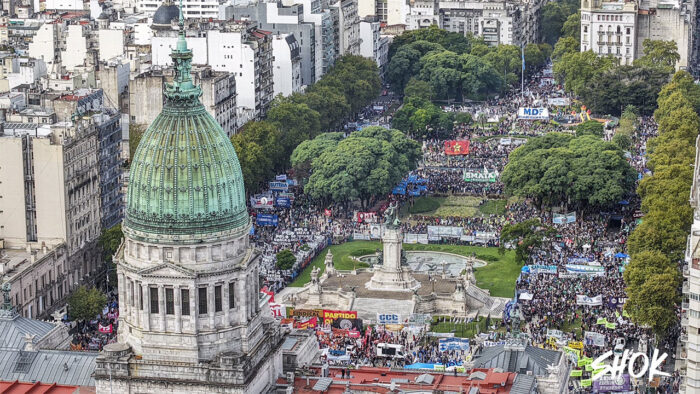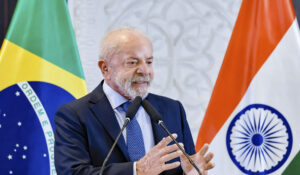
Published 11/04/2025 16:46 | Edited 11/04/2025 17:08
The third general strike against the government of Javier Milei was considered a “resounding success” by the main union centrals of Argentina. The 36 -hour stoppage, which involved public and private sector workers, had strong adhesion throughout the country and was called by CGT (General Labor Confederation), CTA (Argentine Workers Center) and Autonomous CTA (Argentine Autonomous Workers Center).
The Secretary General of Autonomous CTA, Hugo Godoy, assessed that the strike marks a turning point in the Argentine social humor. In conversation with the RedGodoy pointed out that the stoppage had strength especially in strategic sectors such as industry, ports, banks and public services.
He also warned the impact of the precariousness of labor relations on strike capacity. “The search for daily livelihood makes it difficult for many informal workers to adhere to a strike, but we still had a very strong answer,” he said.
For central leaders, the protest expresses the exhaustion of popular patience in the face of the economic policy of tightening, mass layoffs and new debt with the IMF.
In a press conference held on Thursday (10) at CGT headquarters, in Buenos Aires, the central secretary general, Héctor Daer, stressed that the movement was a clear demonstration that “Argentina cannot have free prices and flat salaries.”
He criticized the fall of the purchasing power of workers and retirement, the collapse of the provinces’ economies and the dismantling of public works.
Union criticism has gaining back up in recent research. According to an analogy consultant survey, 53% of Argentines believe inflation is not falling, 64% say poverty has not decreased and 61% reject the new agreement with the IMF.
In addition, 87.3% defend an emergency recomposition of social security benefits, demonstrating widespread dissatisfaction with the direction of the economy.
Daer stated that the strike was a “resounding success” and highlighted its concrete effects. “The country’s main strategic venture, Cow Muerta, is totally paralyzed.” This is the second largest shale gas reserve in the world and one of the largest unconventional oil deposits in Latin America, located in the province of Neuquén.
The demonstration of the day before, in Plaza de Los dos Conggrees, was described by Daer as “multitudent”. Already Hugo Yasky, from the CTA of Los Workers, stated that “the Argentine people said enough to the policies of cruelty.”
From north to south of the country, the strike had strong adhesion. In cities such as Rosario and Neuquén, there were highway blocks, union mobilizations and even community kitchens organized by social movements.
In Mendoza, only three of the 27 programmed flights took off. In Cordoba, La Rioja, Catamarca, Tucumán and other provinces, the trade worked partially and the streets were empty.
In the National Congress, the stoppage was practically total. The three main representative entities of the servers – APL, up and UPCN – joined the movement, leaving Parliament without activities. Legislative TV was down and no commission gathered. Even the voting calendar has been changed.
The mobilization also faced repression. The Federal Police and the Coast Guard prevented protesters of the popular movement La Dignidad blocked the puenment Pueyrredón in Avellaneda. The entity repudiated violence and accused the Malei government of implementing “debt policies and repression” with the support of Security Minister Patricia Bullrich.
Union centrals also denounced the use of government propaganda against the movement. In train and subway stations, speakers have transmitted messages such as “attack on the Republic: the union caste attentive against millions of Argentines who want to work.”
In response, railways reacted with irony. “This is not Star Wars, will work,” they announced through the wagons sound system. For Daer, these campaigns are “very similar to those used in non -democratic periods.”
Even with the attacks, popular support for the government has been falling. According to an analogy consultant survey, 53% believe inflation is not falling, 64% say poverty has not decreased and 61% reject the new agreement with the IMF. The survey also shows that 87.3% defend an emergency recomposition of social security benefits.
Unionist Ernesto Quiqui, from the World Union Federation (FSM Cone South), reinforced in an interview with Red that Malei “rules for the great capitals” and adopts a “neocolonial and neo -fascist” project. For him, union mobilization is essential.
“There is no cohesive force of the workers’ movement today. But Milei is being struck by his own mislobe.
This week’s general strike may not be the last. According to CGT, next May 1 will be marked by a new fighting journey. “As long as this policy of falling income and destruction of pensions is maintained, there is no possible way out. Never has the fund has been a solution to the Argentine people,” Daer concluded.
Source: vermelho.org.br

